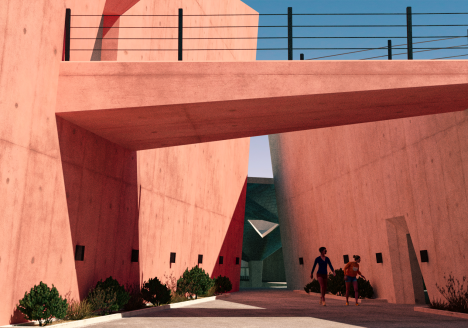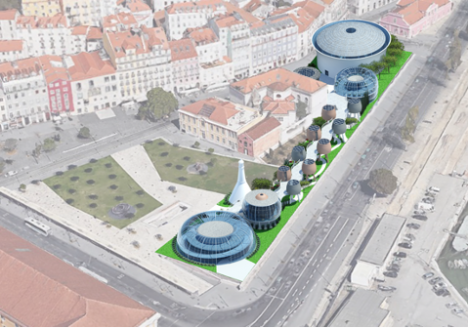Winners of the James W. Strutt Memorial Award in Geometric Form & Function
July 23, 2023
Two undergraduate students with “playful minds” have won the James W. Strutt Memorial Award in Geometric Form & Function for projects designed for the historical Alfama district in Lisbon, Portugal.
Darion Dillabaugh received the 2022-2023 award for Ceramica da Marinha. Sarah Mojeski took the 2021-2022 award for The Pottery Garden. Each will receive $500. See the projects below.
The award recognizes students in the Bachelor of Architecture Studies program who demonstrate excellence in developing form using geometry and related topics as a generative design process applied creatively to address structural and spatial possibilities.
“Both had fantastic, inquisitive, rational but also playful minds, daring when pushed beyond their comfort zone,” said Adjunct Professor Honorata Pienkowska. “One can only wish to have students like that, and luckily I did.”
Dillabaugh and Mojeski produced their winning projects in the third-year Directed Studies Abroad (DSA) Global Studio led by Pienkowska. The studio theme, “Tracing the Intangible,” focused on Portugal and Morocco and the concept of cultural heritage.
Pienkowska led the 2022-2023 studio group, which included Dillabaugh, to those countries last February.
DSA trips did not occur for the previous two years, meaning Mojeski’s class did not travel. “COVID-19 kept us on the ground, forcing Sarah’s imagination to work overtime,” says Pienkowska.
The studio project was a public building on a highly visible, historically significant, and intensely urban site in Lisbon, Portugal.
The building’s main purpose was the dissemination of knowledge about one of 25 “Intangible Cultural Heritage of Humanity” designations awarded by UNESCO to Portugal, and independently selected by each student as their project theme.
Pienkowska instructed students to use light and shadow as tools of expression and include a range of spatial internal and external components reflective of the program’s needs. A primary goal of the design was a skillful interpretation of the building’s theme.
2022-2023 Winner
Student: Darion Dillabaugh
Project: Ceramica da Marinha
Description: The purpose of Cerâmica de Marinha was to fill a vacant lot in Lisbon’s Alfama district with a program that would enhance the area. Sensitivity to context was a driving force throughout the design process. A concerted effort was made to keep the profile of the buildings low and to step upwards to match Alfama’s hilly character. It was also important to avoid obscuring views of the historic district from the water. The proposed intervention drew inspiration from Portuguese azulejos; a decorative ceramic tile used extensively in the local architecture. The building houses studios dedicated to ceramics, multipurpose areas for hosting events, a centre for selling ceramics, and a restaurant. Pigmented concrete was used for most of the envelope to complement the color palette of the surrounding buildings. The overall form was an abstracted interpretation of shards of broken pottery.

Jury comment: “A conceptually, programmatically, and culturally rich project. The exploration into shards of pottery and their possibilities resulted in a series of conjoined irregular triangulated slabs, creating a series of interconnected internal and external spaces. The exhibit hall playfully reflects the angular planes of the additional buildings in the complex. The colour palette and roof lines harken back to the surrounding traditional architecture. The angular forms take on a sense of restful play, washed by the light of the Portuguese sun.”
2021-2022 Winner
Student: Sarah Mojeski
Project: The Pottery Garden
Description: The Pottery Garden is a site for the preservation and production of Portuguese black pottery. The design features a picturesque walking experience through an architectural-scaled pottery garden, with the buildings functioning as workspaces and display opportunities for the production process and products of the site. Their unique forms take on a playful approach to spark joy in colour, texture, and form. Individual studios create a canopy walking path through the garden to link the private workspaces on the west end and the public display buildings on the east side of the site. The proposal aims to be a space of tranquillity in the preservation of Portugal’s cultural heritage to continue inspiring the traditional making of black pottery.

Jury comment: “A playful and immersive project that demonstrates the process of exploring a singular form through its dynamic iterations. As object, to volume, to deconstructed tangents, the project simultaneously speaks to the throwing of a piece of pottery to its use, to its encapsulation as an item to be displayed. The project takes a joyful meandering trip through the site, anchoring the concept in varying layers of permeability but consistently revealing the geometrically related forms and initial materiality of pottery forms.”
About the James W. Strutt Memorial Award in Geometric Form & Function
The award was established in memory of James W. Strutt, a former professor and director of the architecture school, with donations from family, friends, professional peers, and fellow faculty.
This prize commemorates Strutt’s passion for geometry and its generative properties in developing both exploratory and pragmatic solutions, as he demonstrated in his academic and professional careers.
A committee of equal representatives from faculty and the Strutt Foundation awards the prize. It goes to outstanding undergraduate students enrolled in the Bachelor of Architecture Studies program who demonstrate excellence in the development of form using geometry and related topics as a generative design process applied creatively to address structural and spatial possibilities.
The student work is evaluated on:
• Its experimental character;
• The critical and creative thinking applied to the inquiry;
• The approach to physically performing structures as a highly logically constrained and disciplined exploration aimed at finding the appropriate match between the adopted geometry and the project’s defined problem.